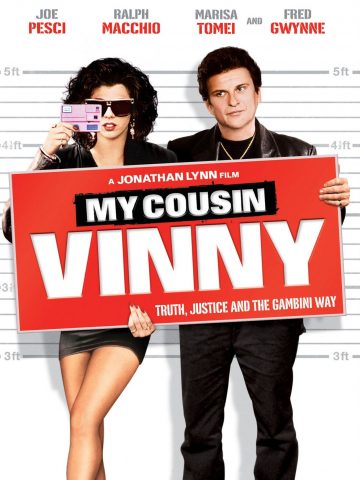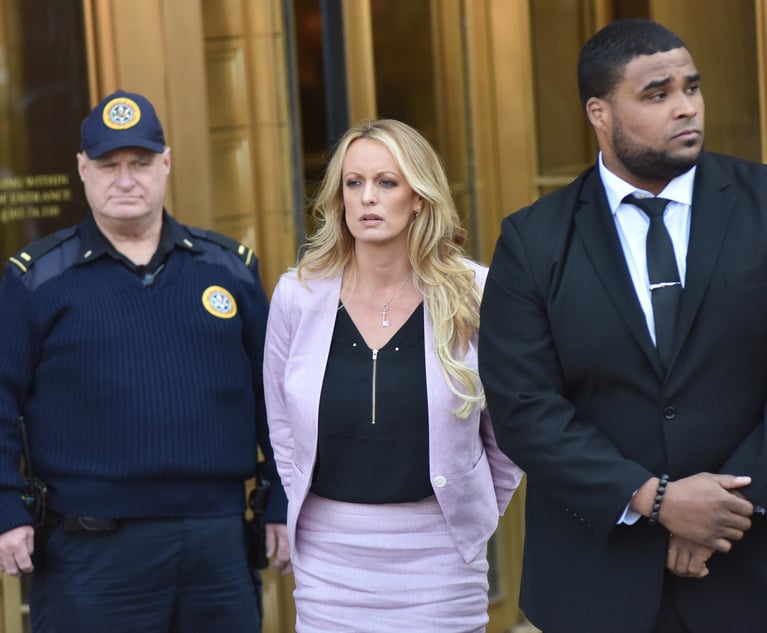Lessons From 'My Cousin Vinny'
There is much to learn from the movie, including how to deal with a hostile witness and how to effectively examine an expert. The movie has as much potential to educate as it does to entertain.
September 14, 2018 at 02:28 PM
4 minute read
 We recommend that all young trial lawyers watch the movie “My Cousin Vinny.” In fact, seasoned trial lawyers can learn much from watching this film. The better the trial lawyer, the better the appreciation for the skill and effectiveness of Vinny Gambino's (Joe Pesci) direct and cross-examinations of various witnesses, including his spunky fiancée, the so-called expert on auto mechanics, Mona Lisa Vito (Marisa Tomei), who gets “voir dired” by the prosecutor with a trick question.
We recommend that all young trial lawyers watch the movie “My Cousin Vinny.” In fact, seasoned trial lawyers can learn much from watching this film. The better the trial lawyer, the better the appreciation for the skill and effectiveness of Vinny Gambino's (Joe Pesci) direct and cross-examinations of various witnesses, including his spunky fiancée, the so-called expert on auto mechanics, Mona Lisa Vito (Marisa Tomei), who gets “voir dired” by the prosecutor with a trick question.
The 1992 movie was ahead of its time. There is presently a movement afoot in trial law to move away from Irving Younger's 10 Principles of Cross-Examination that mandates asking only short leading questions and never asking a question to which one does not know the answer. This new method of cross-examination was detailed in a brilliant, recently published book called “The Fearless Cross-Examiner” by Patrick Malone. Malone argues that there are times when it is more persuasive (and less annoying) to use non-leading questions when conducting a cross-examination. He also recommends sometimes asking questions to which one does not know the answer. When speaking across the country about this new method, Malone uses one of Vinny's cross-examinations to demonstrate the effective use of this method.
In cross-examining witnesses, Vinny does not just use short leading questions. For instance, when cross-examining the elderly eyewitness who wore thick-lensed glasses, Vinny does two things brilliantly. First, he makes physical use of the courtroom by having the witness hold the end of a measuring tape and by walking with the tape in hand to a location in the courtroom that the witness indicates is the same distance that she was from the crime scene. Second, as he stands at that location in the courtroom, Vinny does not ask a leading question like “I am holding up two fingers, aren't I,” which would make him sound like a jerk in the presence of this sweet, frail witness. Instead, he asks a nonleading, respectful question, “Mam, how many fingers am I holding up?” Of course, she cannot see to answer.
With another eyewitness, the middle-age gentleman who was making grits, Vinny's examination is again masterful. As with all great witness impeachments, the first thing Vinny does is he gets the witness to commit to his previous testimony about how long he had observed the defendants were in the store (five minutes) which the witness knows because that is how long it took him to make breakfast. Vinny again effectively uses an open-ended question: “How do you know?” He then points out the absurdity of that testimony because the witness was cooking grits, and it takes “the whole grit-eating world 20 minutes to cook grits.”
Vinny then uses sarcasm to get this point across, “Were these magic grits? I mean, did you buy them from the same guy who sold Jack his beanstalk beans?!” He then asks another open-ended question: “Are you sure about that five minutes?” When he doesn't get a straight answer, he does not move on as many trial lawyers would, especially those who use scripted cross-examinations. Instead, he fearlessly presses forward over opposing counsel's objection and the judge's instruction to lay off the witness; he has the witness—by now crestfallen—finally admit “I may have been mistaken.”
Again with the final eyewitness, the middle-aged diminutive man with a thin mustache, Vinny decimates the witness with a number of nonleading questions, asking him to name things that appear in photographs in view from the window where he had observed the crime scene. The witness names a series of impediments to his view of the crime scene. Vinny then combines all of the impediments the witness had named into one final question that casts serious doubt about the witness's testimony that he had seen the defendants at the crime scene—doubt that the witness admits having himself.
There are many other lessons to be learned from the movie, including how to deal with a hostile witness (his fiancée) and how to effectively examine an expert (again his fiancée). The movie has as much potential to educate as it does to entertain.
This content has been archived. It is available through our partners, LexisNexis® and Bloomberg Law.
To view this content, please continue to their sites.
Not a Lexis Subscriber?
Subscribe Now
Not a Bloomberg Law Subscriber?
Subscribe Now
NOT FOR REPRINT
© 2025 ALM Global, LLC, All Rights Reserved. Request academic re-use from www.copyright.com. All other uses, submit a request to [email protected]. For more information visit Asset & Logo Licensing.
You Might Like
View All
The Stormy Daniels 'Hush Money' Trial: Donald Trump Should Be Very Worried
7 minute read
Shining a Light on Opposing Hate: The Palestinian Protesters Who Defended New Haven's Menorah
6 minute readTrending Stories
- 1Snap Paid $63M in Fees to 2 Am Law 200 Firms in '24
- 2Lawyers Across Political Spectrum Launch Public Interest Team to Litigate Against Antisemitism
- 3Jones Day Names New Practice Leaders for Antitrust, Business and Tort Litigation and Latin America
- 4Russia’s Legal Sector Is Changing As Sanctions Take Their Toll
- 5Government Contracting Clients Look to Firms to Stay on Top of Trump Policy Changes
Who Got The Work
J. Brugh Lower of Gibbons has entered an appearance for industrial equipment supplier Devco Corporation in a pending trademark infringement lawsuit. The suit, accusing the defendant of selling knock-off Graco products, was filed Dec. 18 in New Jersey District Court by Rivkin Radler on behalf of Graco Inc. and Graco Minnesota. The case, assigned to U.S. District Judge Zahid N. Quraishi, is 3:24-cv-11294, Graco Inc. et al v. Devco Corporation.
Who Got The Work
Rebecca Maller-Stein and Kent A. Yalowitz of Arnold & Porter Kaye Scholer have entered their appearances for Hanaco Venture Capital and its executives, Lior Prosor and David Frankel, in a pending securities lawsuit. The action, filed on Dec. 24 in New York Southern District Court by Zell, Aron & Co. on behalf of Goldeneye Advisors, accuses the defendants of negligently and fraudulently managing the plaintiff's $1 million investment. The case, assigned to U.S. District Judge Vernon S. Broderick, is 1:24-cv-09918, Goldeneye Advisors, LLC v. Hanaco Venture Capital, Ltd. et al.
Who Got The Work
Attorneys from A&O Shearman has stepped in as defense counsel for Toronto-Dominion Bank and other defendants in a pending securities class action. The suit, filed Dec. 11 in New York Southern District Court by Bleichmar Fonti & Auld, accuses the defendants of concealing the bank's 'pervasive' deficiencies in regards to its compliance with the Bank Secrecy Act and the quality of its anti-money laundering controls. The case, assigned to U.S. District Judge Arun Subramanian, is 1:24-cv-09445, Gonzalez v. The Toronto-Dominion Bank et al.
Who Got The Work
Crown Castle International, a Pennsylvania company providing shared communications infrastructure, has turned to Luke D. Wolf of Gordon Rees Scully Mansukhani to fend off a pending breach-of-contract lawsuit. The court action, filed Nov. 25 in Michigan Eastern District Court by Hooper Hathaway PC on behalf of The Town Residences LLC, accuses Crown Castle of failing to transfer approximately $30,000 in utility payments from T-Mobile in breach of a roof-top lease and assignment agreement. The case, assigned to U.S. District Judge Susan K. Declercq, is 2:24-cv-13131, The Town Residences LLC v. T-Mobile US, Inc. et al.
Who Got The Work
Wilfred P. Coronato and Daniel M. Schwartz of McCarter & English have stepped in as defense counsel to Electrolux Home Products Inc. in a pending product liability lawsuit. The court action, filed Nov. 26 in New York Eastern District Court by Poulos Lopiccolo PC and Nagel Rice LLP on behalf of David Stern, alleges that the defendant's refrigerators’ drawers and shelving repeatedly break and fall apart within months after purchase. The case, assigned to U.S. District Judge Joan M. Azrack, is 2:24-cv-08204, Stern v. Electrolux Home Products, Inc.
Featured Firms
Law Offices of Gary Martin Hays & Associates, P.C.
(470) 294-1674
Law Offices of Mark E. Salomone
(857) 444-6468
Smith & Hassler
(713) 739-1250












